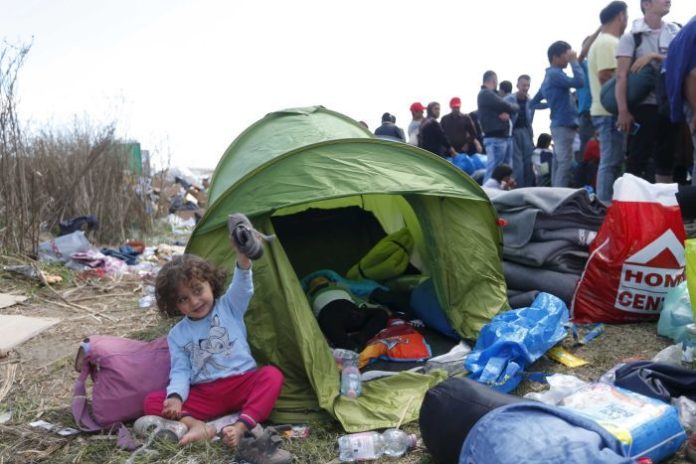Health workers are worried about the risk of disease spreading at a camp for thousands of asylum-seekers in the Hungarian border town of Roszke.
Dozens of vehicles have brought in aid supplies from the UK, Austria and Germany, including blankets, clothes and food.
However, there is a lack of sanitation and medical supplies.
“When you have no running water, no way to clean and people are arriving with contagious diseases, you have a problem,” Doctors Without Borders site team head Teresa Sancristobal said.
Doctors are especially concerned about pregnant women, many of whom have walked for weeks on their journey from warzones in the Middle East.
“We have a lot of pregnant women who are just exhausted and can’t take it anymore,” volunteer medical student Sarah Schober said.
“All we have to give them is magnesium and small doses of schnapps for the cramps, and there are very few field beds for them to rest.”
Exhaustion and dehydration are common.
One volunteer described finding a 12-year-old girl who had walked several kilometres with a broken knee after being hit by a taxi in Serbia.
An over-stretched UN refugee agency has organised for more toilets and clean-up operations, but faces big challenges as government buses are slow to move refugees on to registration centres, leaving thousands to sleep in the fields every night.
“People are shitting and peeing between tents because there is nowhere to go. With the warmer weather, we are one step away from an epidemic,” Ms Schober said.
Volunteers have struggled to find storage for all the clothes donated, many of which have ended up strewn around the squalid site.
“We had a 22-tonne truck show up unannounced yesterday,” British volunteer Mark Wade said.
“That’s great but we don’t know what to do with it.”
There also fears of what will happen on Tuesday, when the Hungarian government says it will completely shut the border and arrest anyone who tries to break through.
“We are doing all this planning, but it could all be for nothing come Tuesday,” one charity worker said.
AFP


